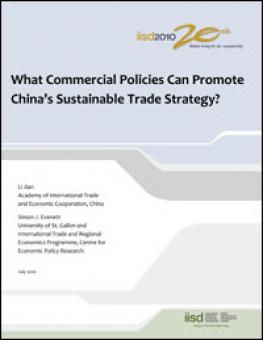
What Commercial Policies Can Promote China's Sustainable Trade Strategy?
This paper examines which commercial policy initiatives might best advance Chinese priorities in a sustainable trade strategy.
We consider potential developments within the World Trade Organization, regional trade agreements (notably in the East Asian region), and investment and sectoral accords. Practical considerations, not least those relating to the sharp recent global economic downturn, point to soft-law sectoral accords, perhaps organized initially on a regional basis, as the most promising starting point. Should the appetite return at the international level for signing and faithfully implementing binding accords, possibilities may arise in the medium - to longer-term for Chinese-led global initiatives that advance sustainable development. Until then, however, policy-makers may have to temper ambitions in this regard.
You might also be interested in
Heatwaves to hit China once every 5 years as global extreme weather events multiply, study finds
Record-breaking heatwaves that have scorched North America, Europe and China are set to worsen in future unless the world stops burning fossil fuels, according to a study by the World Weather Attribution (WWA) academic initiative.
Can China Contribute to Climate Action in Latin America?
Sisi Tang discusses three climate action initiatives between China and Latin America: a crediting mechanism for clean energy, debt-for-climate swaps, and a greener free trade agreement.
Transition from fossil fuels to renewable energy can pose fiscal challenges for India: study
The global transition away from fossil fuels to renewable energy sources could trigger financial challenges for India and major developing countries such as Russia, Brazil and China because of their high dependence on revenues from fossil fuel, according to a study by the International Institute for Sustainable Development (IISD).
IISD Report: Shifting Away from Fossil Fuels Could Lower BRIICS Nations' Revenues
A new report by the International Institute for Sustainable Development (IISD), titled Boom and Bust: The Fiscal Implications of Fossil Fuel Phase-Out in Six Large Emerging Economies, looks at the potential financial ramifications of phasing out fossil fuels in six emerging economies — Brazil, Russia, India, Indonesia, China, and South Africa (BRIICS). They must begin adjusting their fiscal policies to account for declining fossil fuel use or risk a $278 billion revenue gap by 2030.